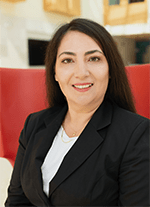As Bulgarian social workers assist thousands of Ukrainian refugees, CSD’s Aytakin Huseynli is leading a group that offers global support.

Aytakin Huseynli knows about living through war. Growing up in Baku, Azerbaijan, she was a child when the Soviet Union collapsed, protesters demanded Azerbaijan’s independence, and the Soviets invaded. She remembers people hiding in basements, her parents lucky to escape massacre. A year later, Azerbaijan was at war with neighboring Armenia over the territory of Nagorno-Karabakh. The war resulted in thousands of displaced people and refugees in Azerbaijan.
This chaos and upheaval, though terrifying, allowed Huseynli to find her calling in social work. It was a field that did not yet exist in her home country: a field she helped to create in Azerbaijan years later, after obtaining her master’s from the Brown School at Washington University. She eventually returned to the Brown School as a PhD student, where she began her work with the Center for Social Development (CSD).
Now a post-doctoral research associate at CSD, Huseynli conducts research on social welfare and child poverty in resource-rich countries, global social work and sustainable development. When Russia invaded Ukraine in February 2022, Huseynli knew she needed to help.
“I have connected with Ukrainians. I visited the country when working on my dissertation,” she explained. “I kept thinking, ‘What can we do right now? How can we be a support for these people?’”
She was unsure of the best way to make an impact. Through Myrna McNitt, a colleague from Lake Michigan College, they eventually reached a connection in Bulgaria, a country receiving Ukrainian refugees. They soon found a ready partner in an NGO called For Our Children. Headquartered in the city of Sofia, it has been assisting families that have fled from Ukraine to Bulgaria.
As a start, they set up a remote meeting with the organization’s leadership. “From that, we realized they needed to talk through the cases they were taking on, some of which were very complex and heavy,” Huseynli said.
The group decided to meet on a regular basis, calling themselves the Global Social Work Consultation. From April to July 2022, they conducted six remote meetings. In the U.S., the partnership consisted of seven social workers from around the globe with expertise in practicing amid armed conflict. In addition to cofounders Huseynli and McNitt, the members include Bonnie Holiday of Dominican University, Valerie O’Brien of University College Dublin, Jill Worrall of Massey University, New Zealand, Carina Santa Maria of Shelter, Inc., and Corrie Sjoblom of Bethany Christian Services.
In Bulgaria, For Our Children typically had 8 to 10 case workers signing on from the cities of Sofia and Plovdiv.
During one of their meetings, Huseynli recalled them discussing the case of a breastfeeding mother who arrived as a refugee in Bulgaria but wanted to leave her baby behind to go back to Ukraine to fight. “There were facing such difficult situations, and so many of them. We were able to offer guidance where we could.”
The group began a second series of meetings in January 2023, and the focus has been a bit different, Huseynli said.
“Previously we concentrated on specific cases, clinical and crisis interventions,” she said. “This winter, we started talking more about how the caseworkers were feeling. There is significant burnout and overwhelm.”
According to data from Bulgaria’s State Agency for Refugees and Chief Directorate Border Police, nearly 1.1 million Ukrainian refugees have entered Bulgaria since the start of the war. The country has registered more than 151,000 refugees from Ukraine for Temporary Protection.
The number is even more remarkable when you realize that the country is only slightly larger than the state of Tennessee, and the field of social work is fairly new in Bulgaria, as it is in Azerbaijan. “It is only for the past 30 years or so that it has emerged,” Huseynli explained.
Huseynli and her team found they were able to help by creating a venue for these frontline workers to talk about the issues they are dealing with and process what they have seen. One of the For Our Children caseworkers, she explained, is a Ukrainian refugee himself. “There were few resources for them to have this kind of support and share their experiences.”
In the U.S., the Global Social Work Consultation, in collaboration with the Center for Social Development, is now discussing ways to build formal capacity in the region. They are in the midst of grant proposals to develop resources for mutual site and study visits, creating a curriculum for the supervision of social workers working with refugees and expanding to other countries that could benefit from similar support services. These could include Tajikistan, Georgia, Kazakhstan and Huseynli’s own Azerbaijan.
“The partnership that Aytakin created is powerful and has demonstrated a need. Not only are her efforts providing critical guidance and resources in Bulgaria, but they will also help to expand the profession of social work and its related resources and capacities in post-Soviet countries,” said Michael Sherraden, CSD’s founding director and the George Warren Brown Distinguished University Professor at Washington University in St. Louis.
“This work is very relevant in so many countries, particularly post-Soviet countries, which have faced war, social unrest and refugee populations,” Huseynli said. “The issues of displaced people are so similar, so universal. It doesn’t matter where you come from. Losing your home is losing your home.”
